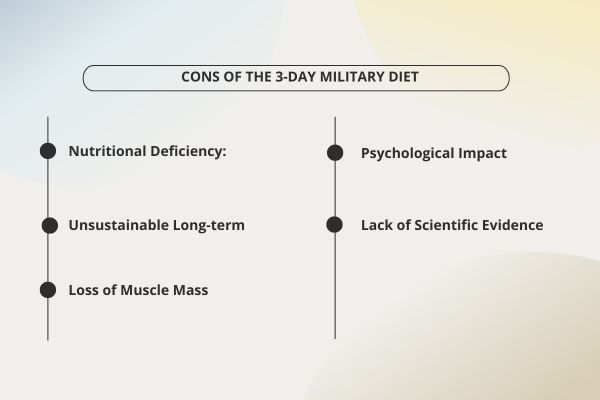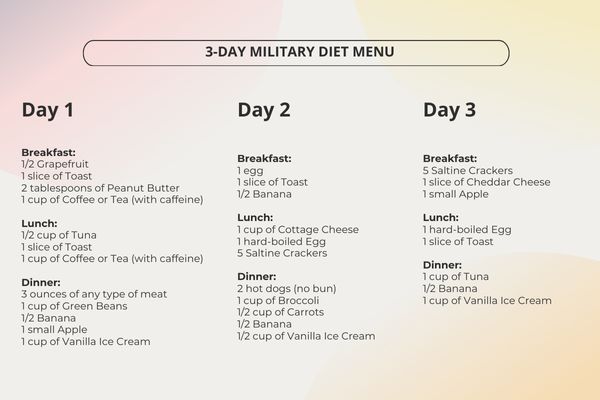Does the Military Diet Really Help You Lose Weight Fast?
Are you looking for a quick way to shed some pounds? The Military Diet, also known as the 3-Day Diet, might have caught your attention with its bold promise: lose up to 10 pounds (4.5 kilograms) in just one week. It’s fast, it’s structured, and it claims to deliver results—sounds amazing, right? But before you dive in, let’s unpack what this diet is all about, how it works, and whether it’s the right choice for you. As a brand focused on your health and well-being, we’ll explore the benefits, risks, and everything in between, so you can make an informed decision.

What Is the Military Diet?
The Military Diet is a short-term, calorie-restrictive weight loss plan designed to help you drop pounds quickly. Despite its name, it’s not affiliated with any military organization—it’s simply a catchy title for a regimen that combines 3 days of strict, low-calorie eating with 4 days of more relaxed, yet still controlled, meals. The cycle can be repeated until you reach your weight loss goal.
The diet’s appeal lies in its simplicity and speed. For the first three days, you follow a rigid meal plan with a daily calorie intake of 1,400, 1,200, and 1,100 calories, respectively. Then, for the next four days, you return to a more typical diet, keeping calories under 1,500 per day. It’s a form of intermittent fasting with a twist, promising rapid results without requiring fancy foods or supplements. But how does it actually help you lose fat? Let’s find out.

How Does the Military Diet Work?
The Military Diet operates on a straightforward principle: calorie restriction. Here’s how it breaks down:
The Two Phases
Phase 1: The Strict 3 Days
- Calories: 1,100–1,400 per day
- What You Eat: A specific menu featuring foods like grapefruit, peanut butter, tuna, and even a scoop of vanilla ice cream (yes, really!).
- Goal: Create a significant calorie deficit to kickstart weight loss.
Phase 2: The 4 “Off” Days
- Calories: Up to 1,500 per day
- What You Eat: More flexibility, but still focused on healthy, portion-controlled meals.
- Goal: Maintain progress while giving your body a break from the strict phase.
Why Does It Lead to Weight Loss?
- Calorie Deficit: By slashing your daily intake, your body burns more calories than you consume, forcing it to tap into stored energy—namely, fat.
- Water Weight Drop: In the first few days, your body uses up glycogen (stored carbs), which releases bound water. This leads to a quick drop on the scale, though it’s not all fat loss.
Proponents claim the food combinations (like coffee with grapefruit or hot dogs with ice cream) boost metabolism or enhance fat burning. However, there’s no solid scientific evidence to support this. The real driver? That calorie deficit.
A Sample 3-Day Military Diet Menu
Curious about what you’d actually eat? Here’s a peek at the classic 3-day menu—simple, quirky, and surprisingly specific:

Day 1
Breakfast:
- 1/2 grapefruit
- 1 slice of toast
- 2 tablespoons peanut butter
- 1 cup coffee or tea (with caffeine)
Lunch:
- 1/2 cup tuna
- 1 slice of toast
- 1 cup coffee or tea (with caffeine)
Dinner:
- 3 ounces of any meat
- 1 cup green beans
- 1/2 banana
- 1 small apple
- 1 cup vanilla ice cream
Day 2
Breakfast:
- 1 egg (cooked any style)
- 1 slice of toast
- 1/2 banana
Lunch:
- 1 cup cottage cheese
- 1 hard-boiled egg
- 5 saltine crackers
Dinner:
- 2 hot dogs (no bun)
- 1 cup broccoli
- 1/2 cup carrots
- 1/2 banana
- 1/2 cup vanilla ice cream
Day 3
Breakfast:
- 5 saltine crackers
- 1 slice cheddar cheese
- 1 small apple
Lunch:
- 1 hard-boiled egg
- 1 slice of toast
Dinner:
- 1 cup tuna
- 1/2 banana
- 1 cup vanilla ice cream
Note: The inclusion of ice cream and hot dogs might raise eyebrows, but they’re part of the plan’s quirky charm—and a way to keep you motivated during the restriction.
Benefits of the Military Diet: Why People Love It
This diet has gained a following for a reason. Here are the pros that make it appealing:
- Structured and Simple: The detailed meal plan eliminates guesswork. No calorie counting or complicated recipes—just follow the list.
- Short-Term Commitment: Three days feels doable, especially compared to months-long diet plans. It’s a sprint, not a marathon (Verywell Fit).
- Rapid Results: The scale drops fast—often due to Water Weight —giving you a motivational boost early on.
- Affordable and Accessible: No need for exotic ingredients or pricey supplements. You can find everything at your local grocery store.
For those who thrive on structure and quick wins, this diet can feel like a game-changer. But there’s another side to the story.
Risks and Downsides: What You Need to Know

While the Military Diet might sound like a dream, it’s not without its pitfalls. Here are the cons to consider:
- Nutritional Deficiencies: The low calorie count and limited food variety (hot dogs and ice cream, anyone?) mean you might miss out on essential vitamins, minerals, and fiber.

- Not Built for the Long Haul: Three days is manageable, but sticking to this cycle long-term? Nearly impossible. Most people regain the weight once they stop.
- Muscle Loss Risk: With minimal protein and calories, your body might break down muscle for energy, slowing your metabolism over time.
- Psychological Strain: Strict rules and hunger pangs can lead to frustration, cravings, or even an unhealthy obsession with food.
- Lack of Evidence: Claims about “metabolism-boosting” food combos are more hype than science. The weight loss comes from calorie cuts, not magic pairings.
The takeaway? It’s a quick fix, but it might cost you more than you bargain for in terms of health and sustainability.
What Do Experts Say?
Many people from all over the world go for this diet, which guarantees fast weight loss in three days, but the 3-Day Military Diet poses some health concerns. Health professionals, including those from the Cleveland Clinic, have weighed in on the Military Diet, and the verdict isn’t glowing:
- It’s Mostly Water Weight: That initial 10-pound drop? Largely water, not fat loss. Once glycogen stores refill, the weight often creeps back.
- Nutrient Gaps: The lack of variety and reliance on processed foods (like hot dogs) can leave your body undernourished.
- Unsustainable Cycle: Yo-yo dieting—losing weight, regaining it, repeating—can mess with your metabolism and morale.
- Health Concerns: Extreme restriction might weaken your immune system, slow your metabolism, or even strain your organs. Plus, it could foster disordered eating habits.
Experts agree: For lasting fat loss, slow and steady beats fast and fleeting every time.
Surviving the 4 “Off” Days: Tips for Success
After the intense 3-day stretch, the next four days are your chance to maintain progress without undoing it all. Here’s how:
- Eat Balanced Meals: Include fruits, veggies, whole grains, lean proteins, and healthy fats for well-rounded nutrition.
- Watch Portions: Use smaller plates or measure servings to avoid overeating.
- Stay Hydrated: Drink plenty of water—it supports weight loss and keeps you feeling good.
- Skip the Junk: Cut back on processed foods and sugary treats that could sabotage your efforts.
- Move Your Body: Add exercise—think 150 minutes of moderate cardio plus strength training weekly—to boost results.
These habits can help bridge the gap until your next 3-day cycle—or transition you to a healthier lifestyle.
Is the Military Diet Right for You?
The Military Diet can deliver quick weight loss, but it’s a double-edged sword. It’s ideal if you:
- Need a short-term drop (like for an event).
- Love structure and clear rules.
- Don’t mind a restrictive challenge.
But it’s not for you if:
- You want sustainable, fat-focused weight loss.
- You’re prone to nutrient deficiencies or eating struggles.
- You value long-term health over short-term wins.
Before starting, consult an expert nutritionist or dietitian. They can assess your health, goals, and whether this plan—or a safer alternative—suits you.
Beyond the Military Diet: Elegant hoopoe services
We have most types of weight loss equipment, including the best noninvasive fat removal and weight loss machines, to help you achieve your perfect body.
The elegant hoop also has the best expert nutritionist, who gives you a personal plan based on your medical history. They follow your plan for losing weight with our clinic to ensure everything goes smoothly and nothing threatens your health conditions.
The alternative ways for losing weight at no risk are:
Summary of Treatments:
| Treatment | Technology | Focus | Number of Sessions | Suitable Areas |
| TruSculpt iD | Radiofrequency | Fat elimination | 1-2 | Abdomen, thighs, arms, flanks, buttocks, chin |
| Venus Bliss | Diode laser + radiofrequency | Fat reduction, collagen production | 3-6 | Abdomen, thighs, arms, flanks, buttocks |
| InfraslimX | Infrared light therapy + vacuum massage | Weight loss, detoxification, circulation | 6-10 | Whole body |
| Icoone Laser | Roboderm technology | Fat reduction, skin tightening | 10-15 | Abdomen, thighs, arms, flanks, buttocks, hips, back, face |
Please remember that achieving the perfect body comes with a combination of many factors, such as regular practice, a healthy diet, using fat removal services, and a peaceful mind. You can read more about the Benefits of Non-Surgical Weight Loss Treatments.
Final Thoughts: A Balanced Approach Wins
The Military Diet is a tempting shortcut, but its intensity and limitations make it a risky bet for long-term success. Gradual weight loss through a healthy diet, regular exercise, and professional support is the gold standard. Your body deserves more than a quick fix—it deserves lasting care.
Ready to explore your options? Contact us at Elegant Hoopoe for personalized plans, advanced treatments, and weight loss services that put your health first. Let’s build a weight loss journey that’s as sustainable as it is successful!







